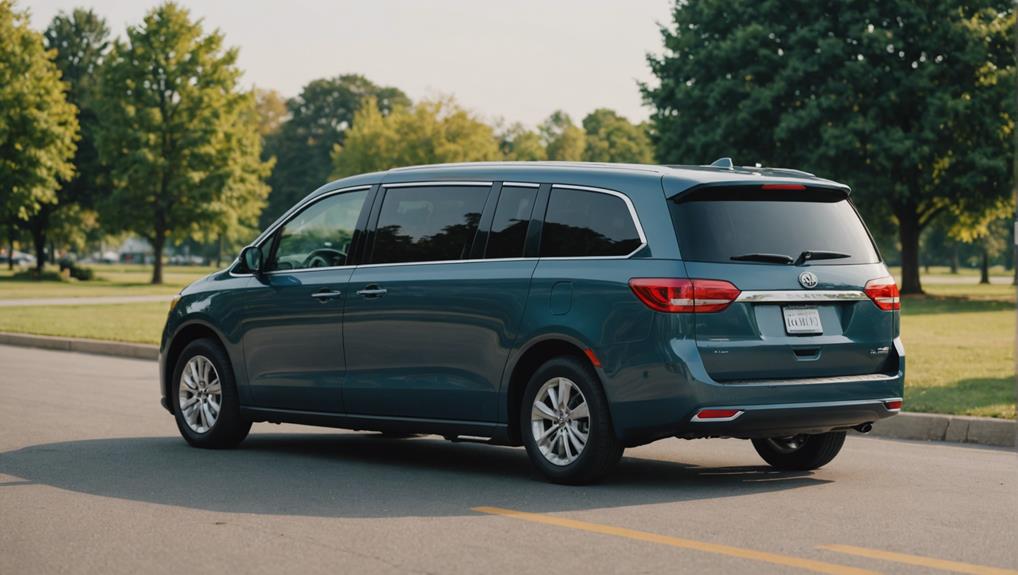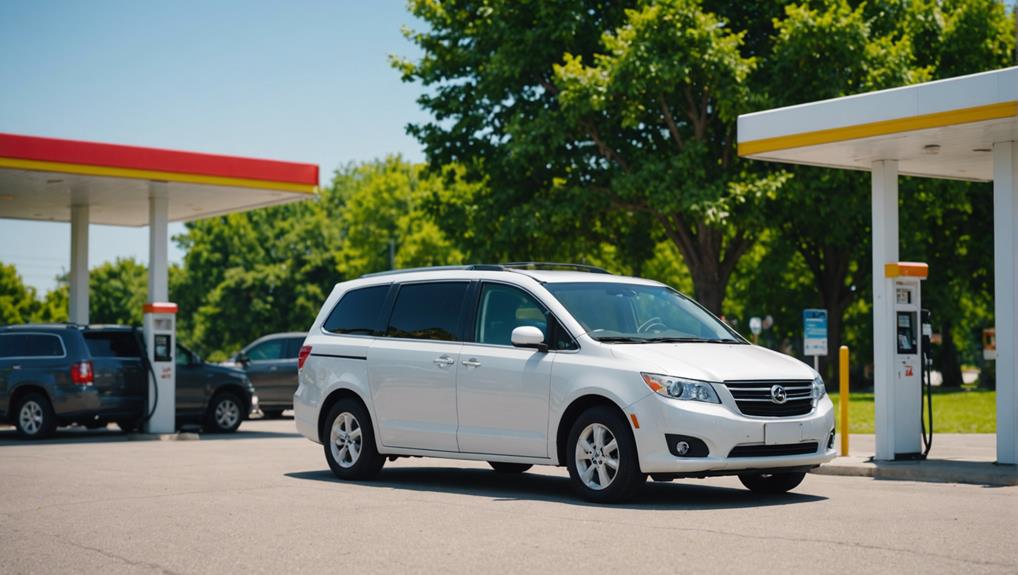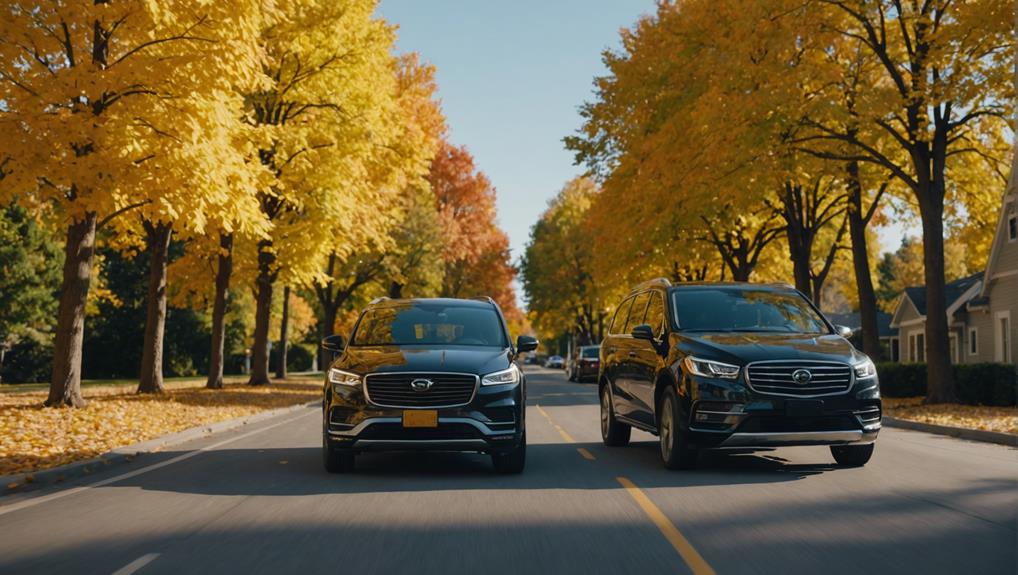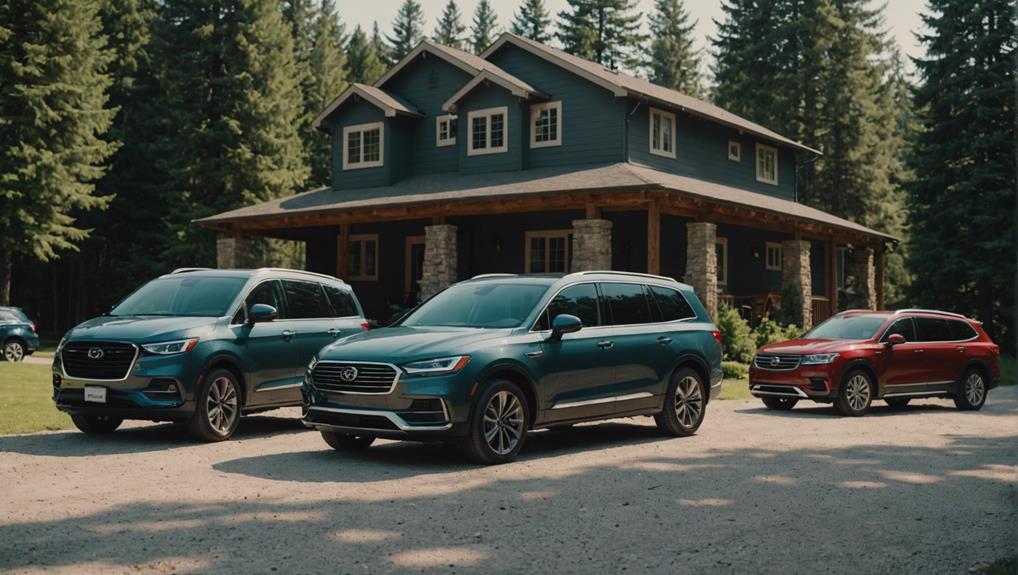When choosing a family vehicle, consider your needs. Minivans like the Honda Odyssey offer the most seating and cargo space with flexible seating. SUVs provide versatility with all-wheel drive and a balance of space, like the Toyota Highlander. Sedans, such as the Honda Accord, excel in fuel efficiency and maneuverability, ideal for smaller families. Minivans are spacious but have moderate fuel efficiency. SUVs vary widely in efficiency and costs, while sedans offer lower maintenance and insurance costs. Safety features are essential, and many family vehicles include advanced tech. To make the best choice for your family's needs, explore further.
Seating Capacity

When selecting a family vehicle, consider how many people you'll regularly need to seat. This decision is vital because it directly impacts comfort and convenience. If you have a large family, a minivan might be your best bet. Minivans often offer seating for seven to eight passengers, making them ideal for bigger families. They also come with easy access through sliding doors, perfect for quickly getting kids in and out.
For families with fewer members, an SUV can be a versatile option. Many SUVs provide seating for five to seven passengers and come with the added benefit of higher ground clearance and all-wheel drive capabilities. This makes them suitable for both urban and off-road adventures. Plus, they often include features like third-row seating that can be folded down when not in use.
If your family is smaller or you don't frequently drive multiple passengers, a sedan could fit the bill. Sedans typically seat up to five people and offer a comfortable ride with better fuel efficiency. They're easier to park and maneuver, especially in crowded urban areas. Choosing the right seating capacity ensures everyone travels comfortably without feeling cramped.
Cargo Space
Cargo space is essential for family vehicles, especially when you need to carry groceries, sports equipment, or luggage for trips. When choosing between a minivan, SUV, or sedan, you'll find varying levels of cargo space that may influence your decision.
Minivans are typically the leaders in cargo space. With their boxy shape and low floor, they offer a large, accessible area for all your gear. Many minivans also have the advantage of fold-flat seats, allowing you to maximize space when needed.
SUVs come in a close second. They offer ample cargo room, especially in larger models. The higher ground clearance can be handy for loading and unloading, though it might be a bit harder for smaller children.
Sedans, while not as spacious, still provide a decent amount of trunk space, especially for smaller families or those without heavy cargo needs. They can be a great option if you're looking for something more compact but still functional.
Here's a quick comparison to help you make an informed choice:
- Minivans: Best for maximum cargo space and flexibility.
- SUVs: Good cargo space with added ground clearance.
- Sedans: Adequate trunk space for lighter, everyday use.
Fuel Efficiency

When choosing a family vehicle, you should consider how different models compare in fuel consumption. Understanding their mileage can help you determine long-term costs. Analyzing this data guarantees you make a budget-friendly decision.
Fuel Consumption Comparisons
Fuel efficiency is an important factor to consider when selecting the right family vehicle, as it can greatly affect your long-term expenses. When comparing minivans, SUVs, and sedans, you'll notice significant differences in how much fuel each type consumes. Each vehicle category has its strengths and drawbacks when it comes to fuel economy.
Generally, sedans are the most fuel-efficient, especially compact and hybrid models. They're lighter and have smaller engines, making them ideal for families looking to save on gas. SUVs, while offering more space and better off-road capabilities, tend to consume more fuel due to their size and weight. However, modern crossovers and hybrid SUVs are improving in this aspect. Minivans fall somewhere in between, offering decent fuel economy along with ample space for passengers and cargo.
To make an informed decision, consider the following:
- Sedans: Best for fuel efficiency, particularly hybrid models.
- SUVs: Higher fuel consumption, but newer hybrids and crossovers are improving.
- Minivans: Balanced option with moderate fuel efficiency and lots of space.
Mileage and Cost Analysis
Frequently, understanding your vehicle's mileage is essential for estimating long-term fuel costs and budgeting effectively. When comparing a minivan, SUV, and sedan, you'll notice significant differences in fuel efficiency. Typically, sedans offer the highest mileage, often reaching 25-35 miles per gallon (mpg) for city driving and even higher on highways. This makes them an economical choice for daily commutes and long trips.
On the other hand, SUVs and minivans generally consume more fuel. SUVs usually average around 20-25 mpg in the city, though some compact models can do slightly better. Minivans fall in a similar range, averaging 18-24 mpg. While these vehicles might offer more space and versatility, you'll likely spend more on fuel over time.
Don't overlook hybrid models, which are becoming more prevalent across all vehicle types. Hybrid sedans can surpass 50 mpg, and even hybrid SUVs and minivans offer improved efficiency, often reaching 30-35 mpg.
When choosing your family vehicle, consider how much you'll drive and the typical fuel costs in your area. Higher efficiency translates to significant savings over the years, making your overall vehicle choice more budget-friendly.
Safety Features
To prioritize your family's safety on the road, it's crucial to explore the advanced safety features available in modern vehicles. Whether you're leaning towards a minivan, SUV, or sedan, each has unique offerings designed to protect you and your loved ones.
First, let's talk about automatic emergency braking (AEB). This feature can detect potential collisions and apply the brakes if you don't react in time. It's a game-changer for preventing accidents. Next, consider vehicles with blind-spot monitoring (BSM). This system alerts you when there's a car in your blind spot, making lane changes much safer. Finally, lane-keeping assist (LKA) helps keep your vehicle centered in its lane, reducing the risk of unintentional lane departure.
- Automatic Emergency Braking (AEB)
- Blind-Spot Monitoring (BSM)
- Lane-Keeping Assist (LKA)
When comparing minivans, SUVs, and sedans, pay attention to how well each model integrates these features. Some vehicles might offer them as standard, while others might include them only in higher trims or as optional add-ons. By focusing on these safety technologies, you're taking a proactive step in ensuring your family's well-being on every journey.
Driving Experience

When selecting a family vehicle, you'll want to think about how it handles and maneuvers on the road. It's also important to take into account the comfort and space it offers for all passengers. Additionally, don't overlook fuel efficiency, as it impacts your budget and environmental footprint.
Handling and Maneuverability
A family vehicle that handles well can make every drive more enjoyable and stress-free. When you're choosing between a minivan, SUV, or sedan, it's crucial to take into account how each vehicle type performs on the road.
Minivans are known for their smooth, car-like handling, making them easy to maneuver, especially in tight spaces like parking lots. Their lower center of gravity compared to SUVs helps in maintaining stability during turns. However, they can feel a bit sluggish on highways.
SUVs, on the other hand, offer a commanding view of the road and are built to handle a variety of terrains. Their higher ground clearance is perfect for off-road adventures, but it can also make them prone to body roll during sharp turns. Modern SUVs have significantly enhanced their handling, offering a balanced mix of power and agility.
Sedans excel in handling and maneuverability due to their lighter weight and lower profile. They're typically more responsive and easier to drive in urban environments. Their precise steering and quick acceleration make them ideal for daily commutes and long drives.
- Minivan: Smooth and stable, but can feel sluggish.
- SUV: Versatile with a higher view, but may experience body roll.
- Sedan: Agile and responsive, perfect for city driving.
Comfort and Space
While handling is key, the comfort and space of a family vehicle can greatly impact your driving experience. When you're behind the wheel for long trips or daily commutes, you want a vehicle that provides ample room and keeps everyone comfortable. Minivans often excel in this department, offering spacious interiors with flexible seating arrangements. You can easily reconfigure seats to accommodate passengers or cargo, making it a versatile choice for families.
SUVs also provide plenty of space, especially larger models. They often come with three rows of seating, ample legroom, and generous cargo areas. If you're frequently driving with multiple passengers or carrying sports gear, an SUV can meet your needs without compromising on comfort.
Sedans, while generally smaller, still offer a comfortable ride for smaller families. They're designed with ergonomics in mind, providing supportive seating and a smooth driving experience. However, the trunk space and rear seat legroom might not be as generous as in minivans or SUVs.
Ultimately, choosing the right vehicle boils down to your specific needs. Consider how often you'll be transporting multiple passengers, the type of trips you'll take, and the comfort preferences of your family members.
Fuel Efficiency
Fuel efficiency plays a significant role in the driving experience, especially for families looking to manage fuel costs and reduce their environmental footprint. When considering a family vehicle, you'll find that each type offers distinct advantages in fuel efficiency. Let's break it down:
- Sedans: Typically, sedans are the most fuel-efficient option. They're lighter and generally have smaller engines, making them great for long commutes and city driving. If you're looking to save on gas, a sedan might be your best bet.
- Minivans: While minivans are larger and heavier, they often offer better fuel efficiency than SUVs of similar size. Modern minivans come with advanced fuel-saving technologies, making them a solid choice for families needing space without sacrificing too much at the pump.
- SUVs: SUVs vary widely in fuel efficiency. Compact SUVs can be surprisingly economical, especially hybrid models. However, larger, traditional SUVs tend to guzzle more gas. If an SUV is on your list, consider a hybrid model to get the best of both worlds.
Choosing the right family vehicle hinges on balancing your need for space, comfort, and fuel efficiency. By understanding these differences, you can make an informed decision that benefits both your wallet and the environment.
Maintenance Costs
When choosing a family vehicle, consider how maintenance costs will impact your budget over time. Each vehicle type—minivan, SUV, and sedan—has distinct maintenance needs. Sedans generally have lower maintenance costs due to simpler mechanical structures and fewer parts that can fail. They often use less expensive tires and parts, making routine services like oil changes and brake replacements more affordable.
Minivans, designed for family use, often come with more complex systems like sliding doors and advanced entertainment setups, which can lead to higher maintenance costs. However, their engines and transmissions are built for durability, which might offset some long-term repair expenses. Just be prepared for occasional higher costs for specialized repairs.
SUVs, particularly larger ones, can be more expensive to maintain. They often have more complex drivetrains, including all-wheel or four-wheel drive systems, which require more frequent and costly maintenance. Additionally, their larger tires and advanced suspension systems can lead to higher costs.
Budget Considerations

Taking your budget into account is crucial when selecting a family vehicle, as it directly impacts both your initial purchase and long-term expenses. You'll need to contemplate the upfront cost of the vehicle, financing options, insurance rates, and ongoing operating costs like fuel and maintenance. Here's a quick breakdown to help you:
- Upfront Costs: Minivans generally have a lower base price compared to SUVs, making them an attractive option if you're looking to save money initially. Sedans are often the most economical.
- Fuel Efficiency: Sedans typically offer better fuel economy than both SUVs and minivans, which can save you money in the long run, especially if you have a long daily commute or frequent road trips.
- Insurance Rates: Insurance can vary significantly between vehicle types. Generally, sedans tend to have lower insurance premiums, while SUVs and minivans can be more expensive to insure due to their size and potential for higher repair costs.
Versatility
A family vehicle's versatility is key to accommodating your diverse needs, whether it's daily errands, school runs, or weekend getaways. Minivans usually excel in this area with their spacious interiors and flexible seating arrangements. You can easily fit your kids, their friends, and all the gear needed for a soccer game or a camping trip. The sliding doors make it a breeze to get everyone in and out quickly, especially in tight parking spots.
SUVs also offer great versatility, often coming with all-wheel drive, which is perfect for tackling various terrains and weather conditions. Many SUVs have fold-flat seats that let you switch from carrying passengers to hauling large items in no time. This makes them ideal if you often find yourself needing to transport anything from groceries to home improvement supplies.
Sedans, while generally more limited in space, can still be quite versatile, especially for smaller families or those who don't need to carry a lot of gear. Their fuel efficiency and easier maneuverability in urban settings make them perfect for everyday tasks and city driving. Each type of vehicle brings its own unique set of versatile features to the table, so think about what suits your lifestyle best.
Popular Models

Several popular models stand out when it comes to choosing the ideal family vehicle. Whether you're leaning towards a minivan, SUV, or sedan, these models offer features that cater to family needs and preferences.
For minivans, the Honda Odyssey is a top choice. It's known for its spacious interior, advanced safety features, and family-friendly amenities like a built-in vacuum. If an SUV is more your style, consider the Toyota Highlander. This midsize SUV offers three rows of seating, excellent fuel efficiency, and a well-rounded suite of safety technologies. For those who prefer sedans, the Honda Accord remains a reliable and practical option with a spacious cabin, comfortable ride, and impressive fuel economy.
Here are some highlights of these models:
- Honda Odyssey: Spacious, built-in vacuum, advanced safety.
- Toyota Highlander: Three rows of seating, fuel-efficient, safety technologies.
- Honda Accord: Spacious cabin, comfortable ride, fuel-efficient.
Each of these models has its own strengths, making them suitable choices depending on your family's specific needs. Take the time to test drive them and see which one fits your lifestyle best. You can't go wrong with any of these options!




